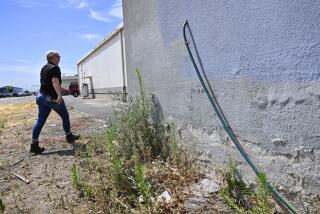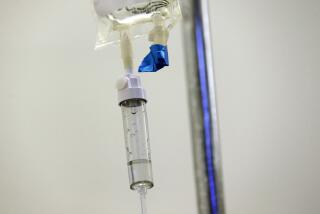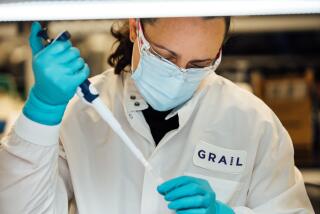Start-ups promoting new blood tests to consumers raise safety and accuracy concerns
The ads for the new blood test, dubbed “the cancer stethoscope,” were designed to grab attention from even the healthiest Americans.
“Did you know?” warned the colorful ads promoting the cancer detection test on Twitter. “1 in 2 men and 1 in 3 women will get cancer.”
For the record:
2:06 p.m. July 1, 2016An earlier version of this headline said start-ups are selling new blood tests directly to consumers. Some of the companies, including Pathway Genomics, require consumers to get approval from physicians before ordering the tests.
Pathway Genomics, a San Diego start-up, directed consumers through the ads to a toll-free number, where a customer service rep linked them to a panel of physicians, who ordered the test. The company then sent a mobile phlebotomist to draw blood at the person’s home or office.
“We’d do it at a gas station if we had to,” Ardy Arianpour, Pathway’s chief commercial officer, told a reporter when the blood test was launched last fall. The company eventually pulled the ads from its website.
Pathway is one of a growing number of start-ups trying to disrupt the $75-billion medical lab business by selling blood tests and other types of medical lab checks directly to consumers.
It’s part of a new frontier of medicine, where tech companies say they are using data, software and genomics to create tools for personalized medicine, letting patients take the lead without always relying on a physician.
But Silicon Valley technologists face steep hurdles in their efforts to revolutionize the medical system the way they have communications or shopping.
And because of the hype surrounding the blood tests — many of which are not backed by reliable scientific studies — patients may be at risk of being misled or even harmed.
All that became clear recently with the crash of Theranos, the once high-flying outfit which sells quick, inexpensive blood tests for a host of diseases. The company said last month that tens of thousands of results it sent to patients were wrong.
The Palo Alto company now faces class-action lawsuits, as well as several government investigations into its operations, including whether it exaggerated the capabilities of its blood-testing technology.
Walgreens, which had built Theranos blood-testing stations in dozens of its pharmacies, said last week it was ending its partnership.
Theranos, Pathway and dozens of other start-ups are relying on a decades-old decision by the Food and Drug Administration that allows them to sell the lab tests without first getting regulators’ approval.
The companies slip into what has become a loophole by designing, manufacturing and using the tests inside a single lab. Because these so-called lab-developed tests once were confined mostly to hospitals and were relatively simple, the FDA decided in the 1970s to do little to regulate them.
But companies are now introducing far more sophisticated tests, looking for more serious diseases with greater consequences for the results, and selling them nationwide.
The explosion of new lab tests range from basic cholesterol checks to much more complex tests using genomics to evaluate health. Upstarts like 23andMe, Color Genomics and Cynvenio are joining a market long dominated by industry giants Quest Diagnostics and LabCorp.
Before Pathway began selling its cancer blood test on Sept. 10, the company had not completed a scientifically controlled clinical trial to show the test worked to detect the disease at an early stage, when patients have few symptoms.
In fact, no company or scientist has yet shown that such a blood test — often called a liquid biopsy — can detect cancer in patients who have no symptoms.
“If you want to prove the test works, it will require trials with thousands of patients,” said Maximilian Diehn, a Stanford oncologist who is separately working on a liquid biopsy testing technique.
The risks of an inaccurate test, Diehn said, include unnecessary treatment, anxiety and additional testing if it wrongly concludes someone has cancer.
Or if the test incorrectly deems the person is cancer-free, he said, the patient may “get a false sense of security” and forgo other recommended tests that could find the disease.
Pathway’s aggressive promotional campaign last fall quickly attracted attention from federal regulators, who have warned other companies marketing the tests directly to consumers.
On Sept. 21, the FDA sent Pathway a letter saying it was “offering a high risk test that has not received adequate clinical validation and may harm the public health.”
Regulators asked to meet with Pathway executives to discuss what evidence the company had to show the test was accurate.
Pathway continues to sell the test, but the company said that after meeting with regulators, it has changed its promotional materials. Consumers must now get a prescription before ordering the test, the company said, and no longer can use its physician panel.
Join the conversation on Facebook >>
“We are working with the FDA to clarify some of the questions and concerns that they have raised,” the company said.
In a statement to The Times, the FDA confirmed that the company had responded to its concerns and has “limited the claims of what their test does to ones that seem to be more in line with the current available evidence.”
Pathway said it developed the blood test according to regulations for lab-developed tests. Those rules require the company to show it has high-quality standards in processing the tests. They do not include determining that the test actually does for the patient what the company claims.
The company said it now is recruiting volunteers for clinical trials to support those claims.
James Plante, Pathway’s chief executive, declined to be interviewed or allow a reporter to visit the company’s San Diego lab. The company processes myriad genetic tests there, including those for heart health and inherited conditions.
“Our claims are based upon a large body of literature that indicates that the 96 mutations that we examine have been associated with some cancers,” the company said in email responses to questions. “We have validated that our test can be positive in some patients with Stage I and II cancers.”
Liquid biopsies could someday be one of the most lucrative lab tests. Doug Schenkel, a Cowen and Company analyst, estimates that giving the test to Americans at their annual checkup could create a market worth more than $100 billion.
A liquid biopsy that accurately detects cancer at an early stage before it has spread could save many lives, scientists say. A blood test is also far less invasive than a surgical biopsy in which doctors remove part of a tumor.
The technology was made possible by a century-old finding that metastatic cancer patients had tumor cells circulating in their blood. Many of the tests being developed search blood samples for DNA from tumors.
Scientists have found late-stage cancers with the technology, said Diehn, the Stanford oncologist, but finding early cancer is far more difficult.
Lured by the potential profit and chance to upend cancer treatment, venture capitalists have poured hundreds of millions of dollars into start-ups working on liquid biopsies.
In January, tech billionaires Bill Gates and Jeff Bezos led a $100-million round of funding for Grail, a new company developing a test. Pathway has raised more than $130 million from investors.
Many of the start-ups are led by software engineers and developers, rather than medical doctors or scientists.
Pathway filled its board with ex-government officials: Former House Speaker Newt Gingrich, former U.S. Agriculture Secretary Dan Glickman, and John Pistole, the FBI’s former deputy director, sit on the company’s strategic advisory board.
On occasion, Pathway has employed a degree of Hollywood glitz in its promotional efforts.
Last year, the company paid for a charity bash inside a hangar at the Santa Monica Airport that was attended by actors Kellan Lutz and Sophia Bush and other stars. The party, which included a performance by Kesha, appetizers and vodka cocktails, was part of the launch of Pathway’s test for the gene mutations known as BRCA1 and BRCA2, which have been linked to breast and ovarian cancer.
In late September, the Kardashians filmed a scene of their reality show at Pathway’s offices.
“You give them a little bit of blood … and they can see if you’re predisposed to cancer,” Kris Jenner told her daughters.
The company said the Kardashians ordered the tests through their physician and were not paid to feature the product.
Pathway and the other start-ups say they are focused on precision medicine — trying to anticipate and prevent disease in the healthy, while more precisely diagnosing and treating the sick.
CEO Plante, a Las Vegas entrepreneur with a bachelor’s degree in electrical engineering, said he founded the company with the goal of making “genetic testing and personalized medicine accessible and affordable to everyone.”
The company is offering the liquid biopsy, selling under the trade name CancerIntercept, for $299 to $699, depending on the length of the patient’s subscription to the testing.
“CancerIntercept can detect a growing tumor in the body, before the patient may notice symptoms,” promised a video the company released in September. “It’s like a cancer stethoscope.”
But several times the company has faced scrutiny from the federal government.
In 2010, the FDA warned Pathway it was selling an unapproved medical device through Walgreens stores when it began offering an at-home genetic test, which came with a saliva-collection vial, for a variety of medical conditions. The drugstore chain quickly nixed the deal.
And in December, Pathway paid $4 million to settle claims by federal prosecutors that it had paid kickbacks to doctors to give their patients the company’s genetic tests.
Pathway said it settled the case to avoid the expense of lengthy litigation and had done nothing wrong.
Worried about the rising number of unproven lab tests, the FDA has proposed strengthening its rules so that the agency can regulate the riskiest of the lab-developed tests.
Last year, the agency released a report detailing how 20 such tests had put people at risk and actually harmed some.
For example, companies have offered prenatal blood tests to examine fetal chromosomes, using a technique called cell-free DNA testing. The tests are sometimes inaccurate, the FDA said, causing women to abort what actually were normal pregnancies.
Even if the liquid biopsy tests eventually are shown to be accurate detectors of cancer, experts say widespread testing of healthy people introduces a host of risks. For example, finding slow-growing cancers that never would become a threat to the person’s health can lead to unnecessary treatment with harmful side effects.
John Ioannidis, a professor at Stanford’s School of Medicine, said the notion of selling quick blood tests at supermarkets and pharmacies makes him uneasy.
“The more you test yourself, the more harm you cause,” he said. “The odds that this could be a disaster are pretty high.”
Gary Robbins of the San Diego Union-Tribune contributed to this report.
ALSO
Can coffee cause cancer? Probably not, but make sure it isn’t very hot, WHO says
Scientists synthesize the shortest known genome necessary for life
New method for predicting breast cancer risk suggests about 30% of cases could be prevented







